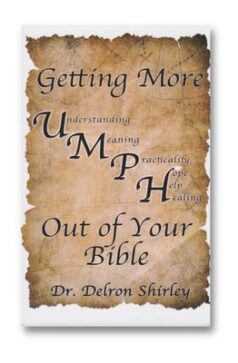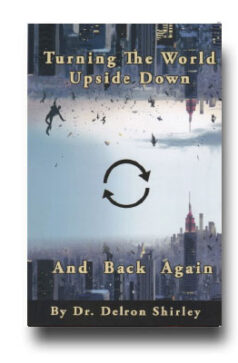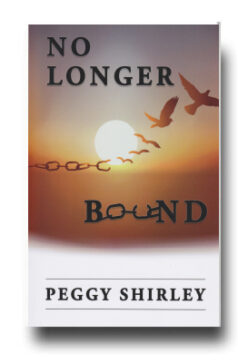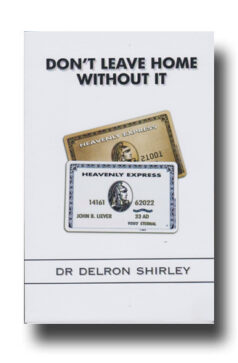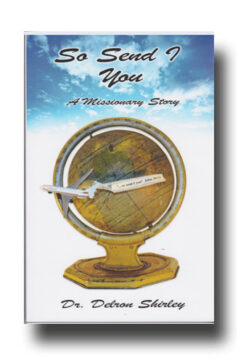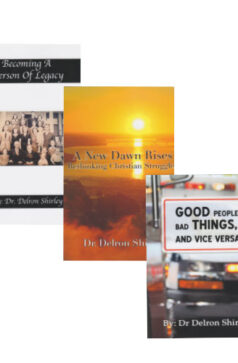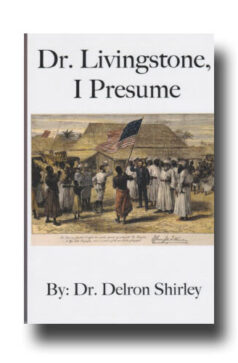Have you ever noticed how it’s always the Democrats or Republicans who are at fault? We always want to blame the President – and always without even giving him the respect of prefacing his name with the title “President” or even “Mr.” It’s just “Clinton” or “Bush” or “Obama” or “Trump” who has created all our woes. In fact, President Harry S. Truman kept a plaque engraved with the words “The buck stops here,” on his desk as a constant reminder that he needed to take the blame for all the troubles in the country. He knew that if he didn’t accept it willingly, the blame would be forced upon him anyway.
Actually, governments and political forces really are a major reason that good people suffer bad things. Just think back to the individuals I introduced in the opening chapter. My student and Jane from Rwanda, Maria in the Nazi concentration camp, Julie in the Congolese civil war – all their pain was inflicted because of governments or forces instigated by attempts to change governments. My mission work has taken me to literally the ends of the earth where I have witnessed every kind of possible suffering as a result of governmental abuses.
I was in Leningrad, Russia, prior to the collapse of the Iron Curtain and witnessed the depraved condition of the people. There were long lines – usually a couple of blocks long – outside each little shop as the people hoped to be able to get enough food to feed their families for the day. Walking around the lines, I would look into the windows of the shops to see that they had almost nothing on the shelves – meaning that only the first few people in line would be able to get anything and the rest would have to go home hungry. When I revisited the same city – by then known as St. Petersburg – after the fall of Communism, I found a thriving economy where there was an abundance of everything. There was no comparison between the impoverished city where people lacked the basis necessities and the new city where every imaginable luxury was readily available. The difference was that there was a new government with a new mindset and a new concern for the citizenry.
In a Muslim-dominated area of Africa, I met a young lady who had been branded as an “enemy of the state” because of her evangelical Christian activity. Sentenced to death before a firing squad, she was lined up with several other convicted “political criminals.” When the triggers were pulled, the bullet intended to take her life miraculously missed its intended target; however, she fell to the ground with all the other victims and pretended that the bullet had done its assigned job. For the rest of the day, she lay motionless in a pile of corpses that had been thrown very unceremoniously into a mass grave. Only after nightfall was she able to slip away under the cover of darkness.
Although I have personally never found myself in such a life-or-death situation, I have had many instances where anti-Christian governments have “played their hand” against me. In one Asian nation where religious freedom is technically part of the constitution, the officials have to grant me permission to hold pastors’ conferences; however, they still have the right to determine when they will sign off on the official documents. I have arrived in the country not knowing for sure if the endorsement had actually been issued. Of course, they would always grant the permission – at the last minute – when it was too late for any of the out-of-town delegates to make arrangements to attend the meetings. Even with the proper authorization to conduct the meetings, we keep the windows tightly shut and the curtains drawn so that no one on the street can register a complaint about the Christian activity inside the building. Even the leader of the meetings is cautious about being seen with the “outsider” in public. He always enters the building through a different door from the one I use, knowing that even a glimpse of him with the Western Christian will result in a visit from the authorities and a grueling interrogation as soon as I am out of the country. In another Asian country, where we also have to make sure to keep the doors and windows tightly closed, the Christians have to move the venues of their church meetings, Bible studies, and prayer sessions on a regular basis to avoid being raided and arrested.
My work in Nepal began just as the government was going through a reformation process – shifting from a Hindu state to a democratic nation. Prior to that time, the nation was ruled by a king who was considered to be not just a human dignitary but actually a divine ruler in that he was seen as the reincarnation of the Hindu god Vishnu. In a country that was supposedly ruled by an actual deity, any religion other than Hinduism was totally outlawed. Since Siddhartha Gautama was born in Nepal and since the religion he founded is similar to Hinduism in many ways, Buddhism was accepted and actually revered; however, Christianity was considered an alien threat and was heavily persecuted. All Christians who came to do humanitarian work in the country had to sign non-proselytizing contracts which gave them the right to run schools and clinics in the country as long as they didn’t share their faith. Any violation of this contract could get them thrown into prison or kicked out of the country. The few national believers in Nepal were subject to constant danger, and I got to know many who had spent time in prison, who had lost their jobs, and who had been beaten for their stance as Christians. Under the influence of the Hindu government, the persecution filtered into all levels of society – including the families. Many of my friends in the country told me of being kicked out of their homes because they had accepted Christ. The face of one woman who always sat on the front row in the services – clapping, dancing, and praising God with all her heart – was terribly disfigured. At first, I assumed that her deformity was the result of leprosy since that disease was prevalent in the nation at that time. One day I asked the pastor about her, and he explained that the scars were the result of her husband having thrown battery acid in her face when he discovered that she had been attending Christian meetings.
I have also spent time in the nation of Hungary where I met many believers who lived through the years of the Nazi occupation and then suffered through decades of Communist oppression. Their stories of imprisonment, depravity, and tyranny are too horrid to repeat, but I will share just one little snippet from the life of one friend who was miraculously saved just hours before the secret police were to come for him and his family. Because he was outspoken about his faith, the government had confiscated his property, taken away his passport, and placed him on their active “watch list.” Supporting his family as best as he could by doing handyman jobs in the city, he found work one day painting a house in one of the high-rent districts of town. In what seemed like an “out of the blue” question, the lady of the house asked him if he had a passport. When he answered that he did not, she replied that he should bring all the documentation and photos for his family members when he came to work the next day. It turned out that the lady’s husband was the head of the passport office, and she was able to convince him to issue valid travel documents for my friend and his family. When he received the papers, he and his family immediately fled the country. Later, he discovered that his name was at the very top of the list that the government had intended to “detain,” a term that meant to be brought into the House of Terror in Budapest – a large facility on the banks of the Danube River where he would be interrogated, subjected to a mock trial, tortured to the breaking point, and forced to make a confession. Then, he would be hanged and his corpse ground to powder and tossed through shoot that dumped the remains into the river – never to be heard of again.
And then, there was my friend who lived through Idi Amin’s reign of terror in Uganda, followed by the equally horrible Milton Obote regime. His stories of the “disappearance” of his father and mother, the confiscation of his business, the destruction of the entire social structure, and the unfathomable bloodshed make you wonder how any human can even think of such atrocities – much less, actually execute them upon other humans.
Of course, the Bible is full of examples of the sufferings that result when evil people gain power and control. Pharaoh demanded that every male Hebrew baby be fed to the crocodiles. (Exodus 1:22) The governors in Babylon tossed Daniel to the lions (Daniel 6:15-16), and the king threw Daniel’s three companions in the fiery furnace (Daniel 3:19-22). The king of Persia allowed one of his top nobles to convince him to exterminate the entire Jewish population throughout all hundred and twenty-seven provinces of the kingdom. (Esther 3:8-12) Queen Athaliah massacred everyone she chose – including her own children and grandchildren. (II Kings 11:1) Jezebel set in motion a strategy to slaughter all of God’s prophets. (I Kings 18:4) King Herod decreed that every male baby in the Bethlehem region be ripped from his mother’s arms and butchered before her eyes. (Matthew 2:16)
The list of evil biblical rulers who inflicted suffering upon the good people under their authority could go on and on; however, there is just one thing that I want to point out here, “When the righteous are in authority, the people rejoice: but when the wicked beareth rule, the people mourn.” (Proverbs 29:2) The bottom line is that good people will suffer bad things as long as evil men and women remain in political power. Understanding this principle and seeing how that every government in the world is in the hands of people of varying degrees of corruption and malicious intent, we must ask one simple question, “What can we do? What must we do?”
The Apostle Paul gives us one simple answer, “I exhort therefore, that, first of all, supplications, prayers, intercessions, and giving of thanks, be made for all men; For kings, and for all that are in authority; that we may lead a quiet and peaceable life in all godliness and honesty.” (I Timothy 2:2)
Notice the multiplied commands – not just prayer, but supplications, intercessions, and thanksgiving. Let’s take a few minutes to dissect the apostle’s directive to see exactly what he was trying to say to us. Supplication speaks of making humble – but persistent – requests. In essence, such prayers are not demanding prayers like John and James intended to unleash upon the Samaritans by calling fire to consume them when they did not welcome Jesus. (Luke 9:52-54) No wonder they they were nicknamed, “the sons of thunder”! (Mark 3:17) Although we have no record of the prayers that Joseph prayed while in the pit, in Potiphar’s house, or in the prison, there certainly was no indication that he wanted lightning bolts to strike down anyone. Alternately, he must have prayed prayers of supplication for everyone who had wronged him. Otherwise, it would have been impossible for him to later face them with such a gracious and forgiving attitude.
Notice that the next command was that prayers be offered for – not about – all men. There is a world of difference in praying for someone as opposed to praying about him. I experienced this principle in a very dramatic way during my doctoral studies. My lead professor – who was supposed to be my mentor – turned out to be my tormentor. Without going into details, let me just make the point that he made my life and experience in the seminary miserable. As you can imagine, I spent a good bit of time praying about the situation – until the day that I got a glimpse into the professor’s personal life. When I realized some of the things that he was going through, I began to pray for him and the situation in his life rather than about how he was affecting me. Almost instantly, things made a total turn-about and I began to experience – as Paul expressed it – “a quiet and peaceable life in all godliness and honesty.”
Intercession is when we pray for others and their needs with the same intensity that we would for ourselves and our own needs. When we realize that the souls of those who oppress us are destined to a Christless eternity in hell, any suffering that we may be experiencing will pale in comparison – a compelling reason to intercede for even our enemies. (Matthew 5:44, Luke 6:28)
Finally, the apostle commanded that our prayers be with thanksgiving. I seriously doubt that he anticipated that we would give thanks for the bad things that are happening in our lives; however, there is always something to be thankful for in that God is giving us the grace to go through the situation. At this point, I need to share a little story that isn’t related to political persecution but it does make a point about the power of thanksgiving. A lady came to me complaining about how she never seemed to be able to “make the ends meet” with her income. When I asked her how many times she had sent her children to school without breakfast, she replied that she had never had to do that. Then I asked if she had ever sent them to school without shoes or proper clothing. Her response was again that she had not had to do so. I then told her to try a little experiment – thank God for the breakfast, shoes, and clothes that she did have rather than to complain about the things that she didn’t have. Today, that woman is a millionaire! God enlarged the little that she had in her hand exactly the same way that He multiplied the fish and loaves on the shores of the Galilee. When the disciples looked at the fish and bread, they saw a problem, “There is a lad here, which hath five barley loaves, and two small fishes: but what are they among so many?” (John 6:9) Jesus, on the other hand, gave thanks rather than a complaint and saw the miracle that fed thousands and wound up with much more left over than what he started out with! (John 6:11-13)
I’d like to conclude this section with a personal story from the Himalayan country of Nepal. During a major portion of the two and a half decades that I have ministered in that nation, there was a violent insurgency by the Maoists who were wanting to take over the government. There was much violence, abundance of bloodshed, and constant disruption in every area of life. We never knew when the insurgents would call a strike and shut down all the businesses, stop all transportation, and cut the supply lines that brought food and goods into the country. My team and I were caught in the middle of such strikes on several occasions; one time, I even had to have an escort of six armed guards to get me from the airport to the hotel. When I encouraged the people of Nepal to pray for rather than about the Maoists, the entire political climate began to shift. Finally, the government and the rebels came to a compromise in which the government accepted the demands that the Maoists wanted to present and the Maoists acknowledged that they could work within the existing government without feeling that that had to totally take over the country. The ultimate concession was that the government allowed the Maoists to be recognized as a legitimate political part and gave them the right to field candidates in the regular elections and hold as many positions in the local and national governments as the voters gave them. But here is the icing on the cake: the final negotiations between the governmental leaders and the leaders of the Maoist party and the final signing of the agreement between them took place in the very hotel where I was staying – just two doors down from my room! I will always feel that it was God’s little way of letting me know that He appreciated the counsel that I had given to the good people of Nepal who had suffered bad things at the hand of the Maoists.



